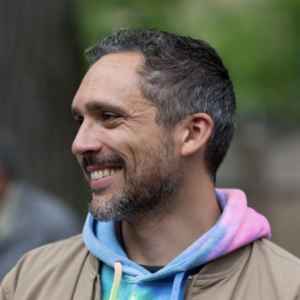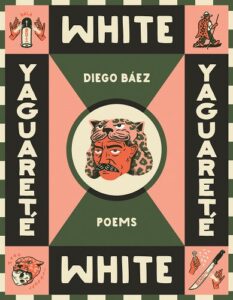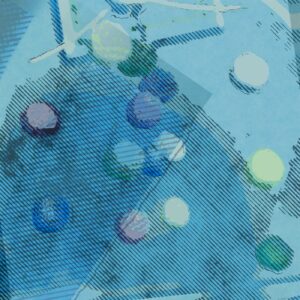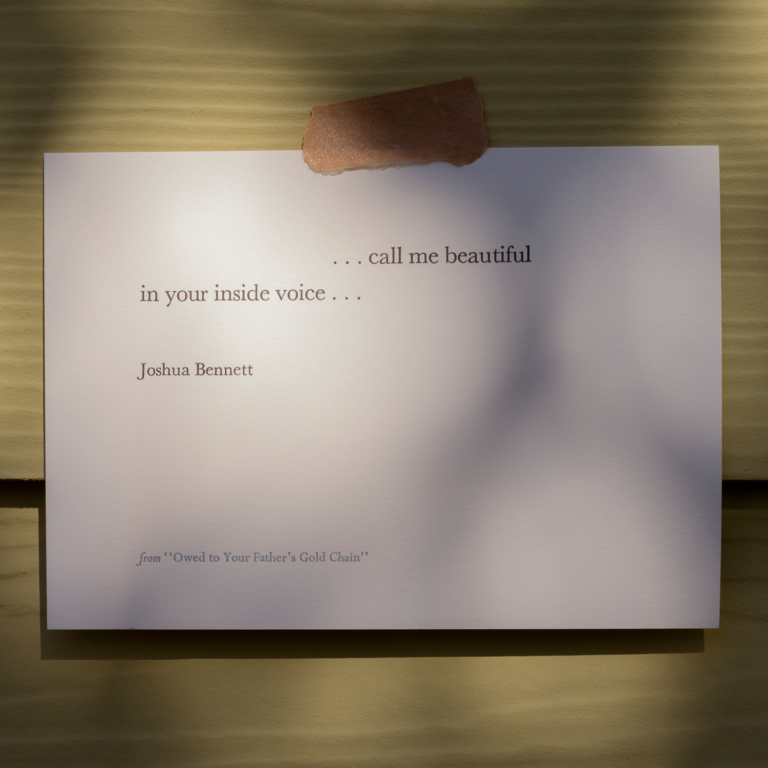Diego Báez
Inheritance
Many people say their experience of time changes after they have children, a phenomenon that Diego Báez captures in “Inheritance.” In this poem, a past, present, and future starring the same child shift ceaselessly in a parent’s mind, like photos flipped through in an album, dots placed on a timeline, moments that one wishes they could build monuments for.
We’re pleased to offer Diego Báez’s poem and invite you to subscribe to Pádraig’s weekly Poetry Unbound Substack newsletter, read the Poetry Unbound book, or listen to past episodes of the podcast. We also have two books coming out in early 2025 — Kitchen Hymns (new poems from Pádraig) and 44 Poems on Being with Each Other (new essays by Pádraig). You can pre-order them wherever you buy books.
Guest

Diego Báez is a writer and educator in Chicago, where he teaches at the City Colleges of Chicago. He earned an MFA in Creative Writing from Rutgers University - Newark. A writer of fiction, nonfiction, and poetry, Báez’s work has been published in Freeman's, The Rumpus, The Georgia Review, The Thing Itself Journal, Number Eleven Magazine, and Hobart. His poetry has appeared in Luna Luna, la fovea, Granta, and elsewhere. He serves as a Director of the Board for the National Book Critics Circle and the International David Foster Wallace Society. Báez was an inaugural fellow at CantoMundo in 2010. Yaguareté White, published in 2024 by The University of Arizona Press, is his debut poetry collection.
Transcript
Transcription by Alletta Cooper
Pádraig Ó Tuama: My name is Pádraig Ó Tuama, and I spend a fair amount of my time doing workshops with groups of people where we look at a poem or we write poems together. And sometimes it happens where we look at a poem and somebody — seamlessly, without any sense of self-consciousness — moves from speaking about the poem into speaking about their own life. The poem changes or invites or opens something up; unfolds some dynamic of themself and suddenly they have changed that poem, too. Because the poem has been desiring somebody to read it like that. Not the original author, but this stranger who’s come to it and is reading themselves in companionship with the poem.
[music: “Praise the Rain” by Gautam Srikishan]
“Inheritance” by Diego Báez
“When my child came into this world,
she didn’t rock mine or turn it upside down
but flipped it inside out. It felt not like a burning fire,
“but like a new chamber opening in my heart,
A fourth dimension unbending
between sternum and spine.
“Surely it had lived there all along,
huddled with the Spanish
I hadn’t spoken in ages.
“Before I was born, my father bought a ‘57 Chevy:
bright green, gas cap inside one silver tailfin.
Ran like shit. Poured smoke. No seat belts.
“My father drove me home from hospital in that thing.
We sideswiped another car on Camelback Bridge in Normal.
Years later, I never learn which party was drunk driving.
“I imagine my Spanish is like that green Chevy:
busted, barely runs, a rickety gift.
But that doesn’t mean it’s not mine to share.
“At first, simple whispers suffice:
words for ‘love’ en Guaraní y Español.
How those early endless hours
“—then days and weeks—
balloon, uninvited, to encompass the story
I tell myself of her genesis.
“The way a point turns to line,
a line to surface, surface to volume,
until all that’s left is time.
“That first long year, when we moved
so seldom, estacionados en la mecedora.
Like a landslide, these evening rocks
“roll into crawling, a crawl to first steps,
her carriage precarious until the wild,
grinning child turns to run.
“And I see her already,
moving through timelines I no longer recognize.
An anchor point or past tangent,
“I’m already a bystander
in the green blaze of her ascendant arc.
She has changed so much—so much of me—already.
“She fills space, and grows, and will not stop
growing, god willing. With hope, Hashem,
shall continue to move
“in pursuit of her futures,
not any one in particular, but all of them
simultaneously
“unfolding like tesseracts
outside the quickly shrinking cage
of a father’s captive heart.
“Because wasn’t it just yesterday
her breath first rounded into syllables,
sílabas into word and words into song?
“Was it not just yesterday
she fit inside the makeshift cradle of my arms,
not yet so far removed from this vast world she’d cracked wide open?
“It’s certain only to quicken.
I see her climb into that bright green Bel Air
destined to face whatever fate alights:
“to swerve away or embrace, to box, to bridge
the distance between her now and future self,
to mind the road for other lives unwinding.
“Of course, all this unfolds and the time it takes to fall asleep,
to sway in the morning sun after a restless night,
her head on my shoulder, something with rhythm on the radio.
“I imagine if there’s an afterlife worth living for,
it’s probably this, just like this, forever.”
[music: “Night Light” by Blue Dot Sessions]
This is a beautiful poem by Diego Báez that is a love poem, really, to his daughter. It is held together by a few images: that terrible green car that his father bought that he’s not entirely sure how it runs and how it got through. But then that green car becomes a metaphor for speaking about his own daughter’s journey through life. She’s asleep. It’s been a restless night. He’s rocking her. There’s some rhythm on the radio. But he’s also thinking about the time when his daughter will go future into a life that he will find strange or that he may not be part of.
Diego Báez has clearly heard the story of him coming home from the hospital as a newborn from some adult that was around there, and the story of that car and the story of the accident and not being entirely sure who was drunk. And later on what we hear is that while he’s holding his daughter, he’s also clear that there’s going to be a story about herself that she’ll tell some of which he might contribute, but he won’t be in complete control of. “At first, simple whispers suffice: / words for ‘love’ en Guaraní y Español. / How those early endless hours // —then days and weeks— / balloon, uninvited, to encompass the story / I tell myself of her genesis.” He’s kind of highlighting that simple words are good at the start, but words are going to evolve. A person is going to have the capacity to narrate their own past, to narrate their own genesis, to have their own point of view. She’s grown up already, even though she’s just been born.
[music: “At Dusk” by Gautam Srikishan]
The first time I had a friend who became a father I was 20. And he said to me, The day she was born, I began freaking out because I realized I wouldn’t be able to pay for her further education. She’s finished her further education now. I’m assuming they figured it all out. But there’s a sense that things change, of course, when you become a parent, but time changes, too. The way that you think of the function of time, the purpose of time, and also the centrality of time. So it isn’t only that time moves fast or slow, and of course, when you’ve got a newborn, time moves both fast and slow. But it’s also that your experience of time, your deep engagement with time, the way that you think about your end, and the way that you dream about the life that your kids will live after you’re gone, that also changes. So it isn’t only that circumstances change. Becoming a parent means that your disposition on the world, and on temporal activity, and on life and death changes. I don’t think it’s only becoming a parent that does that. I think any huge way within which we attach one life to another can create that. But certainly, it’s something you hear all the time from people who’ve become parents that their world turned inside out.
And Diego Báez speaks with us so beautifully at the beginning of the poem with these negations. “When my child came into this world, / she didn’t rock mine or turn it upside down / but flipped it inside out. It felt not like a burning fire,” — there is a negation again — “but like a new chamber opening in my heart, / a fourth dimension unbending / between sternum and spine.” This is the prefiguring in a certain sense, of the tesseract that is mentioned deliberately toward the end of the poem. And I did have to look this up. A tesseract is a four-dimensional hypercube. And you find it in all kinds of references in mathematics and literature and video games. Salvador Dali used the shape of it for his image of the crucifixion. And in “Thor,” it holds the infinity stone that allows interdimensional travel. And in all of them, the tesseract contains some kind of unfolding, some place where entering and leaving occurs simultaneously. Something where time folds in on itself and you can see past, present, and future altogether being held.
[music: “Kindling” by Gautam Srikishan]
This poem is so much about containers — the world, the container of us all, it was flipped inside out at the birth of his daughter. And then the heart, he describes it as “a new chamber opening in my heart, / a fourth dimension.” There’s the 57 Chevy. There’s language as well, “words for ‘love’ en Guaraní y Español.” And then there’s the story that he tells himself of her genesis. And he goes back to talking about his own heart, too. And there’s pain in his prediction of the fact that he’s got a daughter whose very purpose in life is to outgrow being a child and to grow into an adult. “The quickly shrinking cage / of a father’s captive heart.” What gorgeous language there and what painful and beautiful and musical language that he holds together. Time changes, “early endless hours // —then days and weeks.” And then the rocking chair “estacionados en la mecedora.” Stationed in the rocking chair. There is a rocking chair that holds you and you’re stationed in it, but you’re also moving. The child is going from crawling to running, to driving, to going into a future that he won’t comprehend. And then his own body, too. He’s looking at how his experience of his own body has been changed. “Was it not just yesterday / she fit inside the makeshift cradle of my arms.”
And then lastly the question of the afterlife. The container of the afterlife. Maybe for some, that’s a container for hope, but he is not looking to the future now. Ironically, in a poem that is thinking all about the future, he’s thinking that perfection would be to return to this moment. “It’s probably this, just like this, forever.” A beautiful poem that looks at how a container is holding so much more than itself. That you can go deeper and deeper and deeper into it, that the container will change, and also that there’s something eternal by being present in the particular moment.
[music: “Dust of Summer” by Gautam Srikishan]
Diego Báez’s poetry explores Paraguayan and American experience enormously. And the history of Paraguay from indigenous language, Guaraní, his father’s a Guaraní speaker. And thinking about how he is American and Paraguayan and speaks some Guaraní, but not as much as other people. The containers about how it is that identity says who we are and not, and the changing nature of that is evident throughout this poem, too. Again, like one of those four-dimensional hypercubes that keeps on changing and changing.
The title of this poem by Diego Báez “Inheritance” makes us wonder whose inheritance is he talking about? The inheritance that he has from his own childhood? The inheritance of language from his parents’ background and the various places his parents are from? The inheritance that his children will have? Is it a sense of self? Is it a sense of wanting to change? [laughs] Is it a terrible car that runs like shit? It’s all of those things — the limitations, the complications, the beauties.
What is so interesting is that there is so much resistance in this poem to the idea that things stay static. They don’t. There is the dream, of course, the fantasy that the afterlife could be the static moment of this beautiful calm morning with rhythm on the radio. But of course, he knows that that’s not going to be the way; of course, he knows he both longs for and in a certain sense, has some anxiety too about the future that is unfolding before him and his beloved daughter.
[music: “At Dusk” by Gautam Srikishan]
“Inheritance” by Diego Báez
“When my child came into this world,
she didn’t rock mine or turn it upside down
but flipped it inside out. It felt not like a burning fire,
“but like a new chamber opening in my heart,
A fourth dimension unbending
between sternum and spine.
“Surely it had lived there all along,
huddled with the Spanish
I hadn’t spoken in ages.
“Before I was born, my father bought a ‘57 Chevy:
bright green, gas cap inside one silver tailfin.
Ran like shit. Poured smoke. No seat belts.
“My father drove me home from hospital in that thing.
We sideswiped another car on Camelback Bridge in Normal.
Years later, I never learn which party was drunk driving.
“I imagine my Spanish is like that green Chevy:
busted, barely runs, a rickety gift.
But that doesn’t mean it’s not mine to share.
“At first, simple whispers suffice:
words for ‘love’ en Guaraní y Español.
How those early endless hours
“—then days and weeks—
balloon, uninvited, to encompass the story
I tell myself of her genesis.
“The way a point turns to line,
a line to surface, surface to volume,
until all that’s left is time.
“That first long year, when we moved
so seldom, estacionados en la mecedora.
Like a landslide, these evening rocks
“roll into crawling, a crawl to first steps,
her carriage precarious until the wild,
grinning child turns to run.
“And I see her already,
moving through timelines I no longer recognize.
An anchor point or past tangent,
“I’m already a bystander
in the green blaze of her ascendant arc.
She has changed so much—so much of me—already.
“She fills space, and grows, and will not stop
growing, god willing. With hope, Hashem,
shall continue to move
“in pursuit of her futures,
not any one in particular, but all of them
simultaneously
“unfolding like tesseracts
outside the quickly shrinking cage
of a father’s captive heart.
“Because wasn’t it just yesterday
her breath first rounded into syllables,
sílabas into word and words into song?
“Was it not just yesterday
she fit inside the makeshift cradle of my arms,
not yet so far removed from this vast world she’d cracked wide open?
“It’s certain only to quicken.
I see her climb into that bright green Bel Air
destined to face whatever fate alights:
“to swerve away or embrace, to box, to bridge
the distance between her now and future self,
to mind the road for other lives unwinding.
“Of course, all this unfolds and the time it takes to fall asleep,
to sway in the morning sun after a restless night,
her head on my shoulder, something with rhythm on the radio.
“I imagine if there’s an afterlife worth living for,
it’s probably this, just like this, forever.”
[music: “Praise the Rain” by Gautam Srikishan]
Chris Heagle: “Inheritance” comes from Diego Báez’s book Yaguareté White. Thank you to University of Arizona Press who gave us permission to use Diego’s poem. Read it on our website at onbeing.org.
[music: “Praise the Rain” by Gautam Srikishan]
Poetry Unbound is: Gautam Srikishan, Eddie Gonzalez, Lucas Johnson, Kayla Edwards, Tiffany Champion, Cameron Musar, and me, Chris Heagle.
Our music is composed and provided by Gautam Srikishan and Blue Dot Sessions.
This podcast is produced by On Being Studios, which is located on Dakota land. Open your world to poetry with us by subscribing to our Substack newsletter. For links and to find out more visit poetryunbound.org.
Books & Music
Recommended Reading
The On Being Project is an affiliate partner of Bookshop.org and Amazon.com. Any earnings we receive through these affiliate partnerships go into directly supporting The On Being Project.








